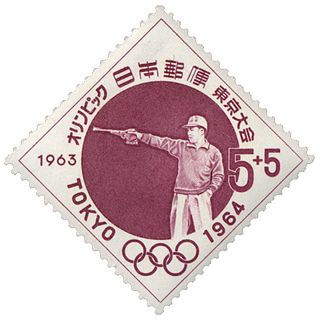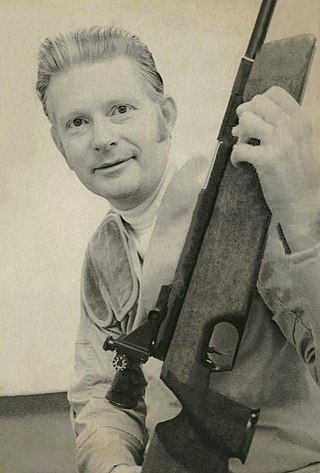
The men's individual competition with revolver and pistol, distance 50 metres was a shooting sports event held as part of the shooting at the 1912 Summer Olympics programme. It was the fourth appearance of the event, which was the only one to have been featured at every edition of the Games to that point. The competition was held on Monday, 1 July 1912. Fifty-four sport shooters from twelve nations competed. Nations were limited to 12 shooters each. The event was won by Alfred Lane of the United States, completing a double for him with the rapid fire pistol event. It was the United States' second victory in the event. Another American, Peter Dolfen, finished second. Charles Stewart of Great Britain took the bronze medal, the nation's first in the free pistol.

The men's ISSF 50 meter pistol competition at the 2000 Summer Olympics was held on 19 September. There were 36 competitors from 27 nations. Nations had been limited to two shooters each since the 1952 Games. Tanyu Kiryakov won, becoming the first shooter to win Olympic gold medals in both this event and 10 metre air pistol. 2.7 points behind, Igor Basinski won his fourth Olympic medal. Kiryakov's gold was Bulgaria's first free pistol victory, and the first medal of any color in the event for the nation since 1980. Martin Tenk's bronze was the Czech Republic's first medal in the event.

The men's ISSF 50 meter pistol was one of the fifteen shooting events at the 1996 Summer Olympics, held on 23 July at the Wolf Creek Shooting Complex in Atlanta. There were 45 competitors from 28 nations. It was the first time decimals were used in the 50 metre pistol finals. Boris Kokorev set a new Olympic record after scoring 570 points in the qualification round and 96.4 in the final, winning the gold medal, while places 2 through 5 were occupied by Belarusian and Italian shooters. Russia, Belarus, and Italy all received their first medal in the free pistol. Silver medalist Igor Basinski was the ninth man to win multiple medals in the event.

The men's ISSF 50 meter pistol was one of the thirteen shooting events at the 1992 Summer Olympics. There were 44 competitors from 29 nations. Nations had been limited to two shooters each since the 1952 Games. The competition was held on 26 July 1992 at the Mollet del Vallès shooting range.

The men's ISSF 50 meter pistol was one of the thirteen shooting events at the 1988 Summer Olympics. It was the second Olympic free pistol competition to feature final shooting, after an abortive attempt in 1960. There were 43 competitors from 31 nations. Nations had been limited to two shooters each since the 1952 Games. The event was won by Sorin Babii of Romania, the nation's first victory in the event and first medal in free pistol since 1972. Ragnar Skanåker of Sweden repeated as silver medalist, the second man to earn three medals in the free pistol; four years later, he would become the first to win four medals. Soviet Igor Basinski took bronze.

The men's ISSF 25 meter rapid fire pistol was one of the thirteen shooting events at the 1988 Summer Olympics. The last Olympic competition on the non-circular target, and the first to feature final shooting, it was won by Latvian Afanasijs Kuzmins after a perfect 300 in the first stage, 298 in the second and two perfect 50 series in the final, thus not allowing Ralf Schumann and John McNally to eliminate his one-point pre-final lead. It was the first gold medal for the Soviet Union in the event. Schumann comfortably won the silver while McNally fell back during the final with a 47 and a 46, finishing seventh and giving way to a third-place tie between Zoltán Kovács and Alberto Sevieri, resolved in Kovács's favour on grounds of higher final score. The bronze was Hungary's first rapid fire pistol since 1952. There were 32 competitors from 23 nations. Each nation had been limited to two shooters since the 1952 Games.

The mixed ISSF 50 meter pistol was a competition at the 1972 Summer Olympics. It was held on 27 August 1972 at Schießanlage in Munich. There were 59 competitors from 36 nations. Nations had been limited to two shooters each since the 1952 Games.

The mixed ISSF 50 meter pistol was one of the seven sport shooting events at the 1980 Summer Olympics. There were 33 competitors from 19 nations. Nations had been limited to two shooters each since the 1952 Games. The gold medal was won by Aleksandr Melentyev of the Soviet Union who broke the world record with 581 points. It was the Soviet Union's third victory in the event, second-most behind the United States at four. Melentyev defeated Harald Vollmar of East Germany by 13 points. For Vollmar this was his third Olympic medal in the same event, having won silver at 1976 Montreal and bronze at 1968 Mexico City. Vollmar was the first man to win at least three medals in the free pistol. Lyubcho Dyakov's bronze was Bulgaria's first medal in the event.

The men's ISSF 50 meter pistol was a shooting sports event held as part of the Shooting at the 1948 Summer Olympics programme. It was the seventh appearance of the event. The competition was held on 2 August 1948 at the shooting ranges at London. 50 shooters from 22 nations competed. Nations had been limited to three shooters each since the 1932 Games. The event was won by Edwin Vásquez of Peru in the nation's debut in the free pistol. Vásquez is still the only Peruvian athlete to win a gold medal at an Olympic Games. Rudolf Schnyder of Switzerland took silver. Defending champion Torsten Ullman of Sweden earned bronze, the second man to win multiple medals in the event.

The men's ISSF 50 meter pistol was a shooting sports event held as part of the Shooting at the 1952 Summer Olympics programme. It was the eighth appearance of the event. The competition was held on 25 July 1952 at the shooting ranges in Helsinki. 48 shooters from 28 nations competed. The maximum number of shooters per nation was reduced to 2, from 3 in previous Games. The event was won by Huelet Benner of the United States, the nation's first victory in the event since 1920. Silver went to Ángel León Gozalo of Spain and bronze to Ambrus Balogh of Hungary; they were the first medals in the free pistol for both nations.

The men's ISSF 50 meter pistol was a shooting sports event held as part of the Shooting at the 1956 Summer Olympics programme. It was the ninth appearance of the event. The competition was held on 30 November 1956 at the shooting ranges in Melbourne. 33 shooters from 22 nations competed. Nations had been limited to two shooters each since the 1952 Games. The winner was Pentti Linnosvuo of Finland, the nation's first medal in the free pistol. The Soviet Union also won its first medal in the event, with Makhmud Umarov's silver. American Offutt Pinion took bronze.

The men's ISSF 25 meter rapid fire pistol was a shooting sports event held as part of the Shooting at the 1960 Summer Olympics programme. It was the 11th appearance of the event. The competition was held on 8 and 9 September 1960 at the shooting ranges in Rome. 57 shooters from 35 nations competed. Nations had been limited to two shooters each since the 1952 Games. The event was won by William McMillan of the United States, the nation's first victory in the event since 1924 and third overall. Silver went to Pentti Linnosvuo of Finland, similarly taking his nation's first medal since 1924. Aleksandr Zabelin of the Soviet Union earned bronze. The three men had tied for first after the main round of 60 shots and had required a three-way shoot-off to determine the medals.

The men's ISSF 50 meter pistol was a shooting sports event held as part of the Shooting at the 1960 Summer Olympics programme. It was the tenth appearance of the event. The competition was held on 5 and 6 September 1960 at the Umberto I Shooting Range in Rome. 67 shooters from 40 nations competed. Nations had been limited to two shooters each since the 1952 Games. The event was won by Aleksey Gushchin of the Soviet Union, as the Soviet team finished 1–2 with Makhmud Umarov repeating as silver medalist. Yoshihisa Yoshikawa of Japan took bronze.

The men's ISSF 50 meter pistol was a shooting sports event held as part of the Shooting at the 1964 Summer Olympics programme. It was the eleventh appearance of the event. The competition was held on 18 October 1964 at the shooting ranges in Tokyo. 52 shooters from 34 nations competed. Nations had been limited to two shooters each since the 1952 Games. The event was won by Väinö Markkanen of Finland, the nation's second victory in the event. American Franklin Green took silver, returning the United States to the podium in the event after a one-Games absence. Yoshihisa Yoshikawa of Japan repeated as bronze medalist, the fourth man to earn multiple medals in the free pistol.

The mixed ISSF 25 meter rapid fire pistol was a shooting sports event held as part of the Shooting at the 1968 Summer Olympics programme. It was the 13th appearance of the event. The competition was held on 22 to 23 October 1968 at the Vicente Suárez Shooting Range in Mexico City. 56 shooters from 34 nations competed. Nations had been limited to two shooters each since the 1952 Games. The event was won by Józef Zapędzki of Poland, the nation's first medal in the event and the first of two victories of Zapędzki. Marcel Roșca's silver put Romania on the rapid fire pistol podium for the fourth time in five Games. Renart Suleymanov of the Soviet Union took bronze.

The mixed 300 m rifle three positions was a shooting sports event held as part of the Shooting at the 1968 Summer Olympics programme. It was the 10th appearance of the event at an Olympic Games. The competition was held on 23 October 1968, with 30 shooters from 16 nations competing. Nations had been limited to two shooters each since the 1952 Games. The event was won by Gary Anderson of the United States, the only person to successfully defend an Olympic title in the event. It was the United States' third gold medal in the event, most of any nation. Valentin Kornev extended the Soviet Union's podium streak in the event to five Games with his silver. Swiss shooter Kurt Müller took bronze.

The mixed ISSF 25 meter rapid fire pistol was a shooting sports event held as part of the Shooting at the 1976 Summer Olympics programme. It was the 15th appearance of the event. The competition was held on 22 and 23 July 1976 at the Olympic Shooting Range, L'Acadie in Montreal. 48 shooters from 30 nations competed. Nations had been limited to two shooters each since the 1952 Games. East Germany did the most possible with that two-shooter limit, taking gold and silver. They were the first rapid fire pistol medals for East Germany and the first medals for any German shooter in the event since 1936. Roberto Ferraris of Italy earned the bronze medal, the nation's first medal in the rapid fire pistol since 1932.

The mixed ISSF 50 meter pistol was a shooting sports event held as part of the Shooting at the 1976 Summer Olympics programme. It was the fourteenth appearance of the event. The competition was held on 18 July 1976 at the shooting ranges in Montreal. 47 shooters from 31 nations competed. Nations had been limited to two shooters each since the 1952 Games. The event was won by Uwe Potteck, with East Germany finishing 1–2 as Harald Vollmar took silver. It was East Germany's first victory in the event. Rudolf Dollinger of Austria repeated as bronze medalist. Vollmar and Dollinger were the fifth and sixth men to win multiple medals in the free pistol. Potteck had only begun the sport 23 months prior to his victory and his previous personal best in domestic competitions was a 568. In addition, his practice scores leading up to the games averaged around 563 to 565.

The men's ISSF 25 meter rapid fire pistol was a shooting sports event held as part of the Shooting at the 1984 Summer Olympics programme. The competition was held on August 1 and 2 at the shooting ranges in Los Angeles. 55 shooters from 31 nations competed. Nations had been limited to two shooters each since the 1952 Games. The event was won by Takeo Kamachi of Japan, the nation's first rapid fire pistol medal. Defending champion Corneliu Ion of Romania took silver, the seventh man to win multiple medals in the event. Finland's Rauno Bies earned bronze, the first medal for a Finn in the rapid fire pistol since 1964.

The men's ISSF 50 meter pistol was a shooting sports event held as part of the Shooting at the 1984 Summer Olympics programme. The competition was held on July 29, 1984, at the shooting ranges in Los Angeles. 56 shooters from 38 nations competed. Nations had been limited to two shooters each since the 1952 Games. The event was won by Xu Haifeng of China, with his countryman Wang Yifu taking bronze. As the free pistol was the first medal event in 1984 and the People's Republic of China fully competed for the first time in 1984, these were the first Olympic medals won by competitors from that nation. Ragnar Skanåker of Sweden took silver, 12 years after winning his first medal ; he was the seventh man to win multiple medals in the event and third to win medals 12 years apart.














